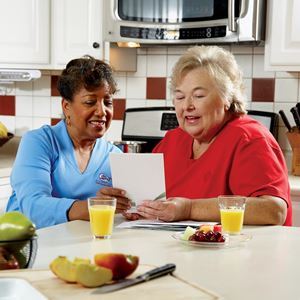Aging’s Impact on Nutrition & Reducing the Risk of Malnutrition
Think, for instance, of all the times you’ve settled for a bagel and a cup of coffee for breakfast, when you know full well that you really should have a more well-rounded meal to start your day.
 Skating By
Skating By
In the midst of our daily lives, it’s not uncommon for us to push our body’s nutritional needs to the backburner. Think, for instance, of all the times you’ve settled for a bagel and a cup of coffee for breakfast, when you know full well that you really should have a more well-rounded meal to start your day.
When it comes to nourishment, we can get away with the bare minimum for a while, but of course, one of life’s greatest inconveniences is that, what we need to function never stays quite the same. This is especially true as we reach older age. But what exactly changes in our body that makes paying closer attention to nutrition so important?
What Changes?
For starters, we experience a gradual loss in muscle mass (something that actually starts in our 30s) and develop a slower metabolism. Bone density also decreases, and organ tissue begins to thin. We don’t often think about these changes because the focus is largely on aging’s effect on physical appearance – but they are still just as real. But despite these changes, our body still requires the same essential nutrients (protein, vitamins and minerals), and sometimes in larger number. The challenge is that, because of our slowed metabolism, we don’t need as many calories, making it vital that we choose foods that are nutrient-rich.
In addition to the physiological changes that take place, seniors may also begin to find less pleasure in eating. On one hand, simply acquiring healthy food may become more difficult, especially if driving is no longer possible. What’s more, many seniors find themselves experiencing a loss of appetite or motivation to eat because of their loneliness. Throughout our lives, meals are often accompanied by social interaction with friends and family. For a senior living alone, the thought of eating may further emphasize his or her lack of companionship.
All of these changes can culminate in malnutrition, a condition that can lead to a rapid decline in health or exacerbate pre-existing health issues. And while it’s estimated that nearly five million seniors are at risk of malnutrition, it’s a condition that is often missed or not properly diagnosed. Fortunately, there are ways for family caregivers to help their loved ones reduce the risk of malnutrition.
Reducing the Risk of Malnutrition
- Make meals more social. Schedule days of the week to go over to a loved one’s home to help prepare meals and provide company. If you can’t physically be there, you can always do a video call with them during dinner time.
- Educate seniors on the importance of nutrient-rich foods. While seniors may know that they need to eat nutritious foods, there may be some confusion on how to go about doing it. Plan a shopping trip with them to identify what to get each week, with consideration of the major food groups.
- Consider meal delivery. Whether it’s through Meals on Wheels or subscription services like Blue Apron or HelloFresh, there are a number of alternatives that aging adults can rely on to get nutritious, well-rounded meals.
- Keep communication open. When in doubt, pay close attention to any changes in a senior’s behavior and be sure to express any concerns you have about their eating habits. As mentioned earlier, emotion can play a significant role in the nourishment we provide for ourselves, so it’s important for aging adults to know that they can about how they’re feeling.
- Consult his or her physician. If you notice that a senior isn’t eating properly (or at all), make sure to work with his or her physician to see what the root cause may be. For instance, a loss of appetite may be caused by a certain mediation, which will then need to be adjusted accordingly. Physician input is especially important if there’s any pre-existing conditions, in which case more specific dietary guidance will be given.
Comfort Keepers® Can Help
Being there for our aging loved ones and helping to personally identify when there’s a problem with their nutrition is important, but we can’t do it all. That’s where we come in. At Comfort Keepers®, we help seniors live healthy, independent lives in their own homes. We understand just how important nutrition is to senior wellbeing, which is why our caregivers provide assistance in preparing healthy, nutritious meals. They can also offer companionship care so that seniors have company while they eat. Additionally, we can help them get to the grocery store and find foods that follow the diet prescribed by their physician. Contact your local Comfort Keepers office to learn more about our services.
References:
MayoClinic. “How to Spot Malnutrition.” Web. 2017.
Food and Nutrition. “How Dietary Needs Change with Age” by Timi Gustafson. Web. 2014.
Tufts Now. “Nutrition Challenges As We Age” by Julie Flaherty. Web. 2017.
Sign up to receive helpful info right to your inbox.
We understand choosing an in-home care provider can be a difficult decision, and we want to make your journey as easy as possible. We're here to support you by providing helpful senior care tips and information on in-home care and senior health and wellbeing topics.
Start a Job with a Purpose
Uplifting training and support for you every step of the way.
Apply to be a caregiver








